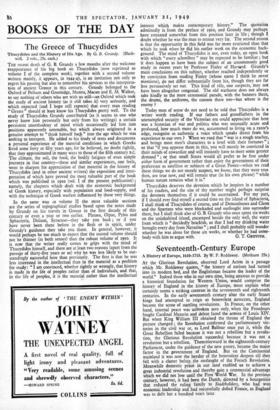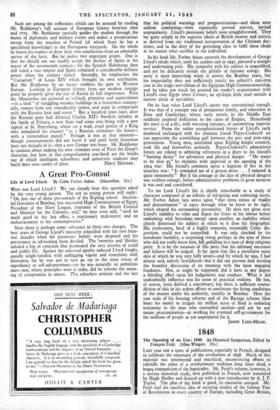Seventeenth-Century Europe
A History of Europe, 1610-1715. By W. F. Reddaway. (Methuen 25s.) AT the Glorious Revolution, observed Lord Acton in a passage which Mr. Reddaway quotes, " the history of nations had turned into its modern bed, and the Englishman became the leader of the world." Indeed those who in our own time, being anxious to provide a historical foundation for Western Union, would comprise the history of England in the history of Europe, must explain what certainly seems a striking contrast in the seventeenth and eighteenth centuries. In the early seventeenth century after the early Stuart kings had attempted to reign as benevolent autocrats, England became the scene of startling revolutions. In France, on the other hand, internal peace was unbroken save only when the Frondeurs fought Cardinal Mazarin and defeat faced the armies of Louis XIV. But when King William III obtained the throne of England the picture changed ; the Revolution confirmed the parliamentary vic- tories in the civil war or, as Lord Balfour once put it, while the Great Rebellion failed because it was not a rebellion but a revolu- tion, the Glorious Revolution succeeded because it was not a revolution but a rebellion. Thenceforward in the eighteenth-century Parliament, under the guidance of the new gentry, became the major factor in the government of England. But on the Continental mainland it was now the heyday of the benevolent despots till they fell with a clatter before the onslaught of the French Revolution. Meanwhile domestic peace in our land enabled us to achieve a great industrial revolution and thereby gain a commercial advantage which we did not lose until the First World War. In the previous century, however, it had been the Dutch, directed by a bourgeoisie that reduced the ruling family to Stadtholders, who had won economic leadership and had successfully defied France, as England was to defy her a hundred years later. Such are among the reflections which can be aroused by reading Mr. Reddaway's full account of European history between 16to and 1715. Mr. Reddaway carefully guides the student through the mazes of diplomatic and military events and makes a perspicacious sweep from the marshes of Poland (of which State he has a specialised knowledge) to the Portuguese vineyards. On the whole he leaves his readers to draw their own conclusions from an admirable survey of the facts. But he makes two important points. One is that we should not too readily accept the decline of. Spain at the outset of the seventeenth century ; for the Spanish Habsburgs then still ruled a vast empire and Spain remained a considerable military power when the century closed. Secondly, he emphasises the
Caesarism " of Louis XIV which brought its own retribution. But Mr. Reddaway by no means confines his gaze to Western Europe. Looking at European history from our modern vantage point he properly gives the rise of Russia its full importance. First the Muscovites are pictured as isolated, primitive and superstitious —in a land "of straggling wooden buildings in a featureless country- side, remote from any considerable centre, and puny in comparison with the Russian heat and storm." But a hundred years later, after the Russian guns had defeated Charles XII's Swedish infantry at the battle of Poltava, a new State had come into being with a new capital at St. Petersburg, where sat a mad, cruel genius of a King who stimulated his country " as a Russian stimulates his horse— with a tremendous punch." Perhaps it was at that moment— though contemporaries did not know it and until lately historians have not thought of it—that a new Europe was born. Mr. Reddaway is cautious about making his own estimates even of Peter the Great's character, but here in this comprehensive text-book are the bricks out of which intelligent schoolboys and university students may







































 Previous page
Previous page